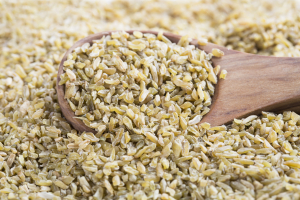Top 6 Health Benefits Of Apple Cider Vinegar
Apple cider vinegar is a well-known home remedy. For millennia, people have utilized it in cooking and medicine. Many individuals believe it can help with a ... read more...variety of health issues, but you may be wondering what the evidence says. Apple cider vinegar provides a variety of health benefits, including antibacterial and antioxidant qualities. Read on for more information.
-
Apple cider vinegar is manufactured in two steps. First, the smashed apples are exposed to yeast, which ferments the sugars and converts them to alcohol. The addition of bacteria then further ferments the alcohol, converting it to acetic acid, the major active ingredient in vinegar. Acetic acid is responsible for vinegar's characteristic sour smell and taste. This acid, according to researchers, is responsible for apple cider vinegar's health advantages. Cider vinegar has an acetic acid content of 5-6%. Organic, unfiltered apple cider vinegar also contains mother, which is made up of protein strands, enzymes, and friendly bacteria that give the product a murky look.
Some individuals assume that the mother is responsible for the majority of the health advantages, however, there are no studies to back this up. While apple cider vinegar is low in vitamins and minerals, it does contain a little quantity of potassium. High-quality brands also include amino acids and antioxidants.

High in healthful substances 
High in healthful substances -
Vinegar can aid in the killing of infections such as bacteria. Vinegar has long been used for cleaning and disinfecting, as well as treating nail fungus, lice, warts, and ear infections. More than 2,000 years ago, Hippocrates, the father of modern medicine, employed vinegar to treat wounds. Vinegar may also be used for food preservation. According to research, it prevents germs like E. coli from developing in and ruining food.
If you're seeking a natural approach to preserving food, apple cider vinegar may be of assistance. Anecdotal evidence suggests that using diluted apple cider vinegar on the skin may assist with acne, but there is no substantial study to back this up.

Can help kill harmful bacteria 
Can help kill harmful bacteria -
One of the most persuasive applications of vinegar to date is in the treatment of type 2 diabetes. Diabetes type 2 is distinguished by elevated blood sugar levels caused by insulin resistance or the inability to make insulin. People without diabetes, on the other hand, can benefit from maintaining normal blood sugar levels since some studies believe that excessive blood sugar levels are a primary cause of aging and numerous chronic illnesses. The most effective and healthiest strategy to control blood sugar levels is to eliminate processed carbohydrates and sugar, but apple cider vinegar may also help.
According to one small study, vinegar may enhance insulin sensitivity by 19-34% following a high-carb meal while also dramatically lowering blood sugar and insulin responsiveness. After consuming 50 grams of white bread, vinegar lowered blood sugar by 31.4% in a short trial of 5 healthy persons. If you are already using blood-sugar-lowering drugs, consult your doctor before increasing your vinegar intake.

May help lower blood sugar levels and manage diabetes 
May help lower blood sugar levels and manage diabetes -
Surprisingly, research suggests that vinegar might help people lose weight. Several human studies have found that vinegar can boost feelings of fullness. This can result in consuming fewer calories and reducing weight. According to one study, consuming vinegar with a high-carb meal boosted feelings of fullness, causing individuals to consume 200-275 fewer calories for the remainder of the day.
However, keep in mind that this research lasted three months, thus the genuine impacts on body weight appear to be minor. Adding or removing particular meals or substances, on the other hand, seldom has a discernible influence on weight. Adopting beneficial and supportive food and lifestyle behaviors leads to long-term weight reduction. Overall, apple cider vinegar may aid in weight reduction by increasing satiety, decreasing blood sugar levels, and decreasing insulin levels. Apple cider vinegar has only three calories per tablespoon, which is quite low.

May aid weight loss 
May aid weight loss -
One of the biggest causes of mortality is heart disease. A number of biological variables have been related to your risk of heart disease. According to research, vinegar may improve some of these risk factors. Many of the investigations, however, were done on animals.
These animal studies demonstrate that apple cider vinegar can reduce cholesterol and triglyceride levels, as well as numerous other risk factors for heart disease. Vinegar has also been found in animal experiments to lower blood pressure, which is a key risk factor for heart disease and renal disorders. There is, however, no convincing evidence that vinegar improves heart health in humans. More research is needed before researchers can draw firm conclusions.

Improves heart health in animals 
Improves heart health in animals -
Apple cider vinegar is a popular treatment for skin diseases such as eczema and dry skin. The skin is mildly acidic by nature. Topical apple cider vinegar may help adjust the skin's natural pH, therefore enhancing the protective skin barrier. Alkaline soaps and cleansers, on the other hand, may aggravate eczema symptoms. Because of its antibacterial qualities, apple cider vinegar may help prevent skin infections associated with eczema and other skin diseases.
Some individuals use apple cider vinegar as a toner or face cleanser. The theory is that it will eliminate bacteria while also preventing spots. However, one research of 22 eczema patients found that apple cider vinegar soaks did not strengthen the skin barrier and caused skin irritation. Before attempting new therapies, especially on injured skin, consult with your doctor. Undiluted vinegar should not be applied to the skin since it might cause burns.

May boost skin health 
May boost skin health



























